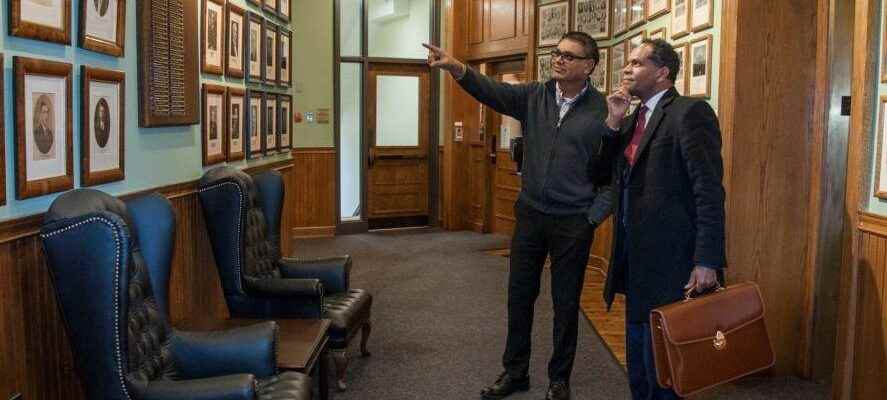
Stratford is gradually becoming a more diverse place to live and now so too are its representatives at city hall.
Demographic data such as gender, age, race and ethnicity are not formally collected for municipal officials in Ontario but, if you take a quick look at the photos hanging outside of Stratford’s council chambers, you’ll be hard-pressed to find any people of colour.
That will change later this month when two incoming councilors – Harjinder Nijjar and Dr. Gezahgn Wordofa – bring some diversity to city council for what could be the first time in Stratford’s 160-year history.
Neither man said the distinction specifically motivated them to run for office, but speaking up for other visible minorities in the community is something both councilors are looking forward to when they’re sworn into office Nov. 21.
“It wasn’t a big factor, (but) we’re seeing the city becoming a lot more diversified; we have a lot more immigrants than we’ve ever had in the past,” said Nijjar, an IT professional and business owner who grew up in Stratford after his parents came to the city from India when he was a toddler. “As I started to (campaign), the amount of outreach I got from other people in other (ethnic) communities – it was overwhelming.”
Stratford isn’t growing as rapidly as some of its booming regional neighbours, but the city still experienced a 5.6 per cent population jump between 2016 and 2021, the latest census figures from Statistics Canada show. The federal agency has reported that among the city’s roughly 33,000 people, roughly 2,600 identify as a visual minority.
If anyone is familiar with the communities those newcomers are a part of, it’s Wordofa.
Originally from Ethiopia, Wordofa immigrated to Stratford in 2011 by way of Russia, where he studied at the University of Moscow. After taking an interest in helping others overcome the financial and cultural barriers of immigration, Wordofa founded the Multicultural Association of Perth Huron two years later.
The organization has since helped thousands of immigrants to Perth, Huron, Bruce and Oxford counties, including those displaced by war in places such as Ukraine, adjust to their new homes.
“Diversity on city council is very important,” Wordofa said. “Council can make wise decisions only when all people, including minorities, are represented.”
Wordofa hosted a small breakfast meeting at the Bruce Hotel on Monday morning where a number of people connected to the association had the opportunity to congratulate him. After experiencing nefarious elections in Ethiopia and Russia, Wordofa said diversity and inclusion will continue to be a priority for him.
“I’m elated and grateful for this opportunity,” he said. “It was great to see the relationship of those who supported me.”
The Association of Municipalities of Ontario launched an initiative to encourage more candidates from diverse communities to run in the 2022 municipal elections. The province’s 444 municipal governments invest revenues of $50 billion annually in important public services and infrastructure, according to figures from that association, making their impact on the day-to-day life of especially significant constituents.
“Municipal government offers the opportunity to make real and positive impact on communities,” Velma Morgan, chair of Operation Black Vote Canada, told association members during the campaign. “To meet the needs of all residents, it is important that municipal councils have many voices at the decision-making table, reflecting the diverse lived experiences of people in the community.”
Stratford’s outgoing mayor, Dan Mathieson, said Nijjar and Wordofa represent the first visible minorities on council during his nearly 30-year run at city hall.
“I think it reflects Stratford as an evolving and developing community and I think it represents progression,” he said. “As we work with our Community Equity Action Team and other efforts around equity, diversity, and inclusion, this is just great to see it take hold at the council table.”
Nijjar said Monday he did experience some racism during his election campaign in Stratford, primarily on social media.
“I know how my parents approached it and I approached it the same way,” he said. “My parents were strong believers that we need to educate. We are different so we need to tell the community and educate the community (about) who we are, where we’re from.”
Having community representatives at city hall who understand what it’s like for a person of color to experience those types of situations is important, Nijjar added.
“I’m looking at (my election) as an opportunity to be a person that can voice their concerns,” he said. “Everybody wants a sense of belonging. Sometimes you don’t feel that way, but I think the city is doing the right things. I think we can always do more to make it better.”
